| Srl | Item |
| 1 |
ID:
144703
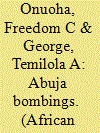

|
|
|
|
|
| Summary/Abstract |
Since his inauguration on 29 May 2015, President Muhammadu Buhari has taken several practical, policy and diplomatic actions aimed at defeating the six-year long insurgency by Boko Haram terrorists in Nigeria. These actions have started to have a modest positive impact on reclaiming the territories previously held by the terrorists. Boko Haram has reacted by ramping up its attacks on soft targets and communities in the north-east. This article focuses on Boko Haram's bombing activities in Nigeria's capital city, Abuja. It shows that between 2011 and 2015, Boko Haram has staged nine bombings in Abuja, resulting in the deaths of at least 191 people, including suicide bombers. It argues that the October 2015 suicide bombings in Kuje and Nyanya, Abuja, represent Boko Haram's bold attempt to respond to President Buhari's counter-insurgency efforts. The article proposes the ‘five Ds’ approach as part of robust measures for combating the insurgency.
|
|
|
|
|
|
|
|
|
|
|
|
|
|
|
|
| 2 |
ID:
087322
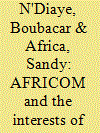

|
|
|
| 3 |
ID:
095949


|
|
|
| 4 |
ID:
099251
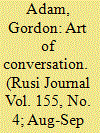

|
|
|
|
|
| Publication |
2010.
|
| Summary/Abstract |
Strategic communications remains in vogue in the fight against the Taliban in Afghanistan. But this is actually a misplaced focus. Crafted messages and one-way communication will likely fall on deaf, cynical ears. More useful is emphasising the creation of a free, open media sector that embraces moderation and dialogue. This model of crisis state communication could more effectively combat the extremist propaganda of the Taliban and Al-Qa'ida.
|
|
|
|
|
|
|
|
|
|
|
|
|
|
|
|
| 5 |
ID:
180791
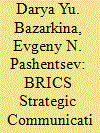

|
|
|
|
|
| Summary/Abstract |
The article examines the current state and development trends of BRICS
strategic communication. Proceeding from the understanding of strategic
communication as projection by a state or an interstate entity of long-term
values, interests, and goals into the minds of audiences by synchronizing
activities in all spheres of public life, the authors analyze the main content
of BRICS strategic communication and assess its prospects amid the
changing world order. The study, conducted from September 2020 to April
2021 on the basis of open sources, made it possible to define the conceptual
basis of BRICS strategic communication; specify the factors underlying
the formation of BRICS strategic communication engendered by the very
nature of cooperation between its member-states; and identify the main
problems and trends in the development of BRICS strategic communication.
The authors conclude that one of the main messages BRICS is sending to
the world through its strategic communication is economic alternativeness,
which allows developing nations and countries under pressure from Western
political, financial, and economic institutions to remain engaged in global
economic processes.
|
|
|
|
|
|
|
|
|
|
|
|
|
|
|
|
| 6 |
ID:
104098
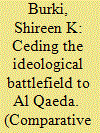

|
|
|
|
|
| Publication |
2009.
|
| Summary/Abstract |
The Bush administration ceded the ideological battlefield to Al Qaeda and affiliates in its Global War on Terror when it failed to clearly enunciate that the terrorist threat to the United States was based on the Wahhabi-Salafi-Deobandi ideological axis. The failure to define the threat by non-state, ideologically driven, actors led to an incorrect approach or strategy that relied more on conventional, kinetic, measures with limited success. The new Obama administration has a window of opportunity to rectify this and to challenge the legitimacy of this ideology in a multipronged strategy of which strategic communication would constitute a critical component.
|
|
|
|
|
|
|
|
|
|
|
|
|
|
|
|
| 7 |
ID:
144340
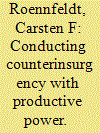

|
|
|
|
|
| Summary/Abstract |
Western governments tend to see power as synonymous with coercive force when they use their military forces in irregular armed conflicts abroad. Yet experiences from recent conflicts like Afghanistan and Iraq suggest that this understanding of power is unable to deliver the desired political ends. In an effort to better analyse and engage the political dynamics that dominate such conflicts, this article points to productive power. This theoretical perspective focuses on the micro-political dynamics that create legitimacy and mobilise people, which seminal counterinsurgency doctrines hold to be the goal.
|
|
|
|
|
|
|
|
|
|
|
|
|
|
|
|
| 8 |
ID:
191002
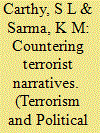

|
|
|
|
|
| Summary/Abstract |
This study presents the findings of a laboratory-based experiment testing hypothesised processes implicated in the prevention of violent radicalisation through counter-narratives. The central aims of the study were to contribute to counter-narrative theory, whilst highlighting the value of experimental methodologies that can be deployed in this area of scientific enquiry. Two counter-narrative strategies were evaluated against a dominant terrorist narrative. Considering the role of cognition in the processing of narrative-related information, participants’ (n = 150) Cognitive Reflection and Need for Cognition were measured before they were randomly assigned to a narrative that legitimized terrorist violence, one of two counter-narratives, or a control. Returning autonomy to the target by having them actively counter terrorist rhetoric themselves was found to be more effective than offering generic counter-narratives. Notwithstanding the challenges and limitations associated with measuring violent radicalization-related constructs, the findings of the experiment demonstrate the extent to which individuals vary in their susceptibility to violent, terrorist narratives, as well as attempts to counter them.
|
|
|
|
|
|
|
|
|
|
|
|
|
|
|
|
| 9 |
ID:
117044
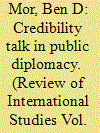

|
|
|
|
|
| Publication |
2012.
|
| Summary/Abstract |
Politics has become a contest of competitive credibility', argued Nye in Soft Power. Indeed, being perceived as honest and reliable is a necessary condition for obtaining and holding the attention of target audiences, as well as for effective persuasion, which is the objective of strategic communication. This task has become all the more difficult with the explosion of information sources and the discreditation efforts of opponents, but it is an essential element in the conduct of public diplomacy. How, then, do states and other international actors go about establishing their credibility while undermining that of opponents? This article employs rhetorical theory, impression management theory, and account theory to situate contests of credibility within the broader context of the accountability of social conduct. The theoretical part discusses the rhetorical strategies that actors use to credit their accounts and discredit those of their rivals. The empirical part addresses the debate between Israel and human rights groups over the Qana bombing incident of July 2006. The analysis of the blame imposition strategies used by Amnesty International and Human Rights Watch and the accounts offered by Israel, indicates the range and variability of credibility talk and the rules for crediting accounts that underlie it.
|
|
|
|
|
|
|
|
|
|
|
|
|
|
|
|
| 10 |
ID:
132525
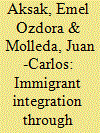

|
|
|
|
|
| Publication |
2014.
|
| Summary/Abstract |
This research focuses on the European Union's (EU) public relations and public diplomacy efforts for immigrant integration. It uncovers the relationship between the EU and leaders of Turkish associations in Brussels, Belgium. In-depth interviews with Turkish association leaders reveal the way they see themselves and the Turkish diaspora, how they reflect on their national identities, and their understanding of EU public diplomacy and public relations strategies. The communication strategies Turkish associations use to gather information about immigrant integration and their opinions on EU communication strategies are also studied. In addition, the research investigates whether two-way communication exists between the Turkish associations and the EU, and unveils the strategic communication and public relations strategies the Turkish diaspora uses to influence public policy and to engage in lobbying.
|
|
|
|
|
|
|
|
|
|
|
|
|
|
|
|
| 11 |
ID:
094716
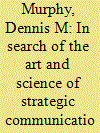

|
|
|
| 12 |
ID:
122236
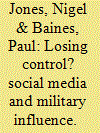

|
|
|
|
|
| Publication |
2013.
|
| Summary/Abstract |
Social media are altering the way in which information is shared worldwide in new and unpredictable ways. The uses of social media as tools of military influence, however, are still to be explored. Nigel Jones and Paul Baines analyse the significance of this change for the nature of strategic communication in the twenty-first century.
|
|
|
|
|
|
|
|
|
|
|
|
|
|
|
|
| 13 |
ID:
171488
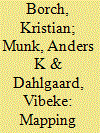

|
|
|
|
|
| Summary/Abstract |
Social media is a powerful communication tool through its universality and ease of access, which potentially has a huge impact on implementation of wind power. This study investigate a large corpus of Danish Facebook pages advocating anti-wind power viewpoints, distinguishing between localisation, different user groups, subjects and activity types. In doing this the following questions are answered: How localised are wind protests on Facebook?; To what extent can we perform a qualitative discourse analysis on different groups of Facebook users?; What can be said about the differences between community and cross-cutting Facebook users?; How are the voiced concerns articulated?; How are concerns managed by Facebook users?
|
|
|
|
|
|
|
|
|
|
|
|
|
|
|
|
| 14 |
ID:
150259
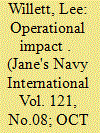

|
|
|
| 15 |
ID:
080876
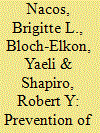

|
|
|
|
|
| Publication |
2008.
|
| Summary/Abstract |
This study finds that the issue of preventing terrorist attacks has received surprisingly little attention by decision-makers and the news media, and only sporadic interest by pollsters. When it comes to homeland security, how to protect the nation and its people from actual attacks takes a back seat to press coverage of threats and other aspects of terrorism, particularly the administration's arguments for fighting the "war on terrorism" abroad as a means to prevent further terrorism at home. This inattention to the difficult task of preventing further catastrophic terror attacks by taking measures at home may affect the nation's vigilance as time has passed since 9/11.
|
|
|
|
|
|
|
|
|
|
|
|
|
|
|
|
| 16 |
ID:
101242
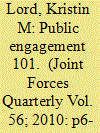

|
|
|
| 17 |
ID:
137316
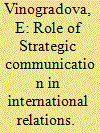

|
|
|
|
|
| Summary/Abstract |
GLOBALIZATION stands out as a major trend in today's world.* Its technological basis is the penetration of information technology into every aspect of social activity; integrating the information systems of different countries into a unified worldwide information sphere; the establishment of a common information space; the creation of global information and communication networks, and the intensive adoption of new information technologies in all areas of human activity.
|
|
|
|
|
|
|
|
|
|
|
|
|
|
|
|
| 18 |
ID:
095954
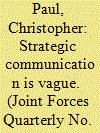

|
|
|
| 19 |
ID:
101243
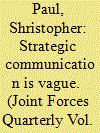

|
|
|
| 20 |
ID:
095822
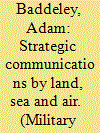

|
|
|